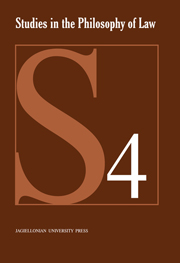Book contents
- Frontmatter
- Contents
- Preface
- Six Causes of the Dispute over Legal Bioethics
- Bioethics and Legal Philosophy
- The Outline of the Subject of Biojurisprudence
- Law and Biotechnology
- The Ethical Significance of Evolution
- Human Nature after Darwin
- The Notion of the Person in Bioethical Debates
- The Roots of Normativity. From Neuroscience to Legal Theory
- Why No One Should Ever Win the Nobel Prize: Neurolaw, Reward and Punishment
- Is There Anybody Who Really Wants to Live Forever? The Significance of Mortality
- The Slippery Slope Arguments Against the Legalization of Physician-Assisted Suicide
- Ethical Problems of Hematopoietic Stem Cells Transplantation
- Notes about the Authors
Is There Anybody Who Really Wants to Live Forever? The Significance of Mortality
Published online by Cambridge University Press: 05 September 2014
- Frontmatter
- Contents
- Preface
- Six Causes of the Dispute over Legal Bioethics
- Bioethics and Legal Philosophy
- The Outline of the Subject of Biojurisprudence
- Law and Biotechnology
- The Ethical Significance of Evolution
- Human Nature after Darwin
- The Notion of the Person in Bioethical Debates
- The Roots of Normativity. From Neuroscience to Legal Theory
- Why No One Should Ever Win the Nobel Prize: Neurolaw, Reward and Punishment
- Is There Anybody Who Really Wants to Live Forever? The Significance of Mortality
- The Slippery Slope Arguments Against the Legalization of Physician-Assisted Suicide
- Ethical Problems of Hematopoietic Stem Cells Transplantation
- Notes about the Authors
Summary
To the Memory of Burt
There was no such person before and never will be again; God will not repeat this. Other people will surely come; a world that will never grow weary, and there will be brought forth many different persons, maybe better, maybe worse, but never, nevermore – the same(J. Michelet, epitaph for the Duke of Orleans).
Introduction: the curse of immortality
From ancient times many philosophers have considered the question of whether it is a bad thing to die. In this essay I would like to concentrate on the question, of whether it would be a good thing not to die. The idea of achieving immortality has been present in human speculation since the dawn of history. Furthermore, this dream has resurfaced not only in the idle speculation of humans but also in scientific research. Alchemists who put all their effort into finding the elixir of immortality have been replaced in our times by scientists who aim at creating a brave new world where people would be able to fully control the act of human birth and death by scientific methods. However, is immortality really something worth desiring?
I think that the average person would answer negatively to the question given in the title of the essay. We can find some vivid depictions which illustrate our fear of a never ending life in literature, where writers such as George Bernard Shaw or Jonathan Swift present the tragedy of the impossibility of finding death.
- Type
- Chapter
- Information
- Studies in the Philosophy of LawLegal Philosophy and the Challenger of Biosciences, pp. 133 - 148Publisher: Jagiellonian University PressPrint publication year: 2010



